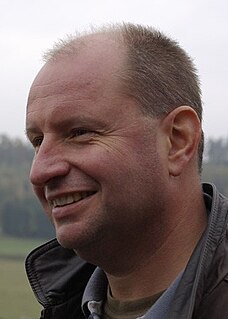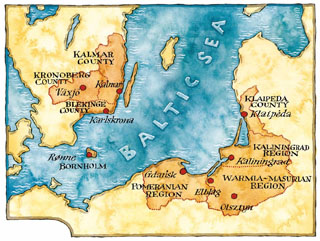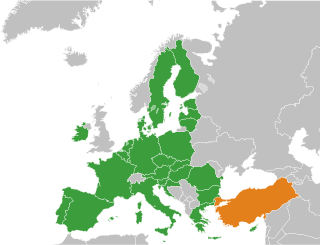Related Research Articles

The Party of European Socialists (PES) is a social democratic European political party.

The European Union (EU) has expanded a number of times throughout its history by way of the accession of new member states to the Union. To join the EU, a state needs to fulfil economic and political conditions called the Copenhagen criteria, which require a stable democratic government that respects the rule of law, and its corresponding freedoms and institutions. According to the Maastricht Treaty, each current member state and the European Parliament must agree to any enlargement. The process of enlargement is sometimes referred to as European integration. This term is also used to refer to the intensification of co-operation between EU member states as national governments allow for the gradual harmonisation of national laws.

The International Commission for the Protection of the Danube River (ICPDR) is an international organisation with its permanent secretariat in Vienna. It was established by the Danube River Protection Convention, signed by the Danube countries in Sofia, Bulgaria, in 1994.

The Movement for a Better Hungary, commonly known as Jobbik, is a conservative political party in Hungary.

The European Social Fund+ (ESF+), created by merging the existing European Social Fund with the EU Fund for European Aid to the Most Deprived (FEAD) and the EU Programme for Employment and Social Innovation (EaSI) in 2021, is the European Union's main financial instrument for supporting employment in the member states of the European Union as well as promoting economic and social cohesion. ESF+ spending amounts to around 10% of the EU's total budget.
The Salzburg Forum (SF) is a Central European security partnership of Austria, Bulgaria, Croatia, the Czech Republic, Hungary, Poland, Romania, Slovakia and Slovenia. Member states cooperate in areas of police cooperation, illegal immigration, witness protection, fight against drugs, traffic safety and other areas of internal security. They also focus on positions coordination and advancing common interests in the European Union in the area of Home Affairs. At least two conferences of interior ministers per year are held. As a rule, three SF ministerial meetings are held per year. One meeting takes place in the country holding the presidency and one further meeting is usually held in summer in Austria. In addition, ministers regularly meet in the margins of EU Council meetings.

The Union for the Mediterranean is an intergovernmental organization of 42 member states from Europe and the Mediterranean Basin: the 27 EU member states and 15 Mediterranean partner countries from North Africa, Western Asia and Southern Europe. It was founded on 13 July 2008 at the Paris Summit for the Mediterranean, with an aim of reinforcing the Euro-Mediterranean Partnership (Euromed) that was set up in 1995 as the Barcelona Process. Its general secretariat is located in Barcelona, Spain.

Thomas Jakl is the former chair of the European Chemicals Agency's Management board and is Deputy Director General of the Austrian Environment Ministry responsible for Chemicals Policy. His field of activity includes legislation on chemical substances at the national, European and UN levels. He served as ECHA's president from 2008 until September 2012. He is president of the Governing Board and "Ambassador" of the EU's Human Biomonitoring program "HBM4EU".

Euroregion Baltic(ERB) is an institutionalised form of cross-border cooperation in the south-east of the Baltic Sea Region, consisting of eight regions of Denmark, Lithuania, Poland, Russia, and Sweden.
The FIMCAP, which is short for Fédération Internationale des Mouvements Catholiques d’Action Paroissiale, is an umbrella organization for Catholic youth organizations. Its 31 member organizations are based in 28 countries. The FIMCAP was founded in 1962 and is recognised as an official Catholic organization by the Dicastery for Laity, Family and Life. FIMCAP is also a full member of the European Youth Forum.

Monika Panayotova is a Doctor of Political Science, with interests in the field of the EU security and defence policy. Bulgarian politician – Monika Panayotova has been appointed as Deputy Minister for the Bulgarian Presidency of the Council of the EU 2018, responsible for the relations with the European Parliament during the Bulgaria's presidency since June 28, 2017.

The Uniqa Insurance Group AG is one of the largest insurance groups in its core markets of Austria and Central and Eastern Europe and has approximately 40 companies in 16 countries and serve about 10.5 million customers. The corporate headquarters is located in the Uniqa Tower in Vienna, Austria and is listed on the Vienna Stock Exchange.

The Berlin Process is a diplomatic initiative linked to the future enlargement of the European Union. It started with the 2014 Berlin Conference, which was followed by the 2015 Vienna Summit, the 2016 Paris Summit, the 2017 Trieste Summit, the 2018 London Summit and the 2019 Poznań Summit. The Berlin Process was initiated in order to consolidate and maintain the dynamics of the EU integration process in light of increased euroscepticism and the five-year moratorium on enlargement announced by Commission President Jean Claude Juncker.

Relations between the European Union (EU) and Turkey were established in 1959, and the institutional framework was formalized with the 1963 Ankara Agreement. Albeit not officially part of the European Union, Turkey is one of the EU's main partners and both are members of the European Union–Turkey Customs Union. Turkey borders two EU member states: Bulgaria and Greece.

Karl Aiginger is an Austrian economist. He was the head of the Austrian Institute of Economic Research (WIFO) between 2005 and 2016, he is a professor at the Vienna University of Economics and Business and an honorary professor at the Johannes Kepler University Linz. He was succeeded by Christoph Badelt as the head of WIFO in September 2016. He established and manages the lateral thinking platform Policy Crossover Center, an interdisciplinary discussion forum on European policy. As an author, he is widely held in libraries worldwide.

Victor Negrescu is a Romanian politician of the Social Democratic Party. He is a Member of European Parliament and he was Minister Delegate for European Affairs in the government of Romania between 2017 and 2018. Since 2007, he is the president and national coordinator of the Romanian network of PES activists.
The Conference on the Future of Europe is a proposal of the European Commission and the European Parliament, announced at the end of 2019, with the aim of looking at the medium to long term future of the EU and what reforms should be made to its policies and institutions. It is intended that the Conference should involve citizens, including a significant role for young people, civil society, and European institutions as equal partners and last for two years. It will be jointly organised by the European Parliament, the EU Council and the European Commission. On 19 April 2021, the multilingual digital platform of the Conference was launched.

The European Green Deal is a set of policy initiatives by the European Commission with the overarching aim of making the European Union (EU) climate neutral in 2050. An impact assessed plan will also be presented to increase the EU's greenhouse gas emission reductions target for 2030 to at least 50% and towards 55% compared with 1990 levels. The plan is to review each existing law on its climate merits, and also introduce new legislation on the circular economy, building renovation, biodiversity, farming and innovation.
References
- ↑ "Home". Youth Goals. Retrieved 2020-12-11.
- 1 2 3 CSUDAY, Gabor Tamas (2019-01-15). "European Youth Goals". Youth - European Commission. Retrieved 2020-12-11.
- ↑ CSUDAY, Gabor Tamas (2019-01-15). "EU Youth Strategy". Youth - European Commission. Retrieved 2020-12-11.
- ↑ CORBINAIS, marlene (2017-10-18). "European Union Youth Conference: Youth in Europe, what's next?". Newsroom - European Commission. Retrieved 2020-12-11.
- ↑ "Van der Bellen warnt vor "altmodischem Nationalismus"". kurier.at (in German). 2018-09-04. Retrieved 2020-12-11.
- ↑ "EU-Jugendstrategie 2019: Gespräche starten im Austria Center Wien". vienna.at. 2 September 2018. Retrieved 2020-12-11.
- ↑ Michalopoulos, Sarantis (2018-04-23). "European Youth conference under Bulgarian Presidency leaves sour aftertaste". www.euractiv.com. Retrieved 2020-12-11.